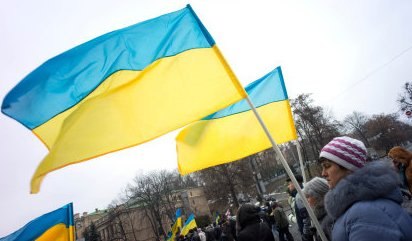Britain and the European Union have been accused of ‘sleepwalking’ into the crisis with Russia over Ukraine.
In an outspoken report, the House of Lords Committee on the EU charged them with failing to realise the depths of Russian hostility to closer links between Ukraine and the West. Its chairman, Lord Tugendhat, said they were guilty of a ‘catastrophic misreading’ of the mood in the Kremlin. The result has been that Vladimir Putin not only seems to be outfoxing his western opponents but also now poses a much wider threat to peace and stability in Europe. Is it right to blame Western diplomatic incompetence for what is going on? And what can we now do to salvage the situation in Ukraine and in Europe more widely?
Just over a week ago, western leaders in the form of the German chancellor, Angela Merkel and the French president, François Hollande, invested a huge amount of time and political energy in all-night talks in Minsk to broker a ceasefire between the Ukrainian government and pro-Russian separatists fighting each other in the east of the country. Angela Merkel emerged saying the agreement offered ‘a glimmer of hope’. It was soon snuffed out. The fighting went on and on Wednesday the separatists drove Ukrainian government forces out of the strategic town of Debaltseve. Fighting continues to go on elsewhere in the country.
Russia has always denied any involvement in what it insists is a purely internal Ukrainian conflict. Few believe this. The separatists have won their victories by the use of sophisticated weaponry they could have got only from Russia. Massive movements of people and equipment have been seen crossing the border between Russia and the areas under separatist control. And the presence of thousands of Russian fighters, many from faraway regions of Russia, seems to prove it. No one, except those who want to, believe their claim to be ‘volunteers’.
Russia made similar denials of involvement last year when pro-Russian forces took control of Crimea, ousted Ukrainian forces and swiftly held a referendum that resulted in a vote for independence from Ukraine. Both Crimea and areas of Ukraine to the east contain large Russian-speaking populations. It is widely believed that Russia wants to create a new pro-Russian state in the region, probably with borders even beyond the territories the separatists already control.
The charge of the House of Lords committee and others is that the West should have seen this coming. In particular we should have shown a greater understanding of Russian concerns and interests to make sure we never got into the dangerous situation in which Europe now finds itself.
This view is based on analysis of what has happened (and what has gone wrong) since the break-up of the Soviet Union over twenty years ago. That break-up led to the countries that had formed the union becoming independent states, free of control from Moscow. Ukraine was one of them
But Ukraine had been a vital part of the Russian sphere of influence long before the Soviet Union was an idea in Lenin’s head. On Russia’s western borders it is geographically in a crucial strategic position between Russia and the West. A very large part of the fighting in the Second World War took place on its soil.
Russia has long had an ambivalent attitude to western Europe. Put crudely, it has never been able to make up its mind whether it wanted to become part of the more advanced west or to define its identity as Slavic and different. It has also been paranoid about being attacked, although perhaps after its experience with Napoleon in 1812 and Hitler in 1941, ‘paranoia’ is an unfair term. As a result it has always felt the need to surround itself with buffer states to protect itself from perceived enemies, not just to the west but also to the Muslim south. The USSR provided Russia with this buffer; its break-up took the buffer away.
The West’s attitude to the events of 1991 was to hope that Russia’s defensive paranoia would disappear along with the Soviet flag. The US president, George Bush senior, looked forward to a united Europe including Russia. The hope was that burgeoning Russian democracy and the experience of cooperation with the West would bring this about.
But enthusiasm for the western embrace was very much stronger not only among eastern European countries, such as Poland and Hungary, previously under the thumb of Moscow, but especially from some former constituent members of the USSR, notably the small Baltic states of Estonia, Latvia and Lithuania. They wanted to join both the European Union and the West’s anti-Soviet defensive military alliance, NATO. When they did so, it served only to increase Russia’s alarm at the loss of its buffers.
Things got tense in 2008 when Russia put a stop to Georgia’s flirtation with NATO (encouraged by some NATO members) by temporarily invading it. But it is Ukraine that has really intensified the issue. In 2013 Ukraine was on the verge of signing an association agreement with the EU when President Putin persuaded his Ukrainian counterpart, Viktor Yanukovych, to dump it and sign up with Moscow instead. The ensuing outcry in the Ukrainian capital, Kiev, led to Yanukovych’s fall and ultimate replacement by a pro-western government intent on joining both the EU and NATO. The result was the take-over of Crimea and the current fighting in eastern Ukraine.
The West has responded by declaring unequivocally that it will not go to war with Russia over Ukraine (even though Britain, among others, committed itself back in 1994 to guaranteeing Ukraine’s territorial integrity as part of a deal in which Ukraine gave up its nuclear weapons). No one is now talking about restoring Crimea to Ukraine. Instead the West has imposed economic sanctions on Russia. These are having a severe effect on the Russian economy but they are also serving to rally popular Russian support for President Putin’s policies.
In the face of the West’s declared unwillingness to counter what it sees as Russian military aggression with a military response of its own, Mr Putin has been testing the waters elsewhere. The three Baltic states, each of which has a substantial Russian population, have seen all manner of Russian provocations, including the abduction of intelligence officers on the border, cyber attacks and infringement of air space. Russian submarines have been detected in the sea off neutral Sweden. And Russian military aircraft have been flying further afield in the West’s domain, including over Cornwall this week, when RAF jets were scrambled to escort them.
This last incursion led the British defence secretary, Michael Fallon, to say that Russia now posed ‘a real and present danger’ to the Baltic states. As members of NATO they are entitled to a full military response from their allies should Russia do more than just provoke them. If NATO failed to come to their aid, Mr Putin would, in effect, have proved that NATO was now a paper tiger.
It is because things have got to this pass, where the very future of NATO may be in question, that critics of western policy, like the House of Lords committee, are so damning. We should never have got here, they argue. Russia’s genuine concerns and interests should have been taken into account before they became something to be fought over. It is one thing for countries formerly in the Russian sphere of influence to join the EU, but quite another to join NATO. Even if the Baltic states and others wanted to join, their desire should have been trumped by judicious concern for Russian reaction. That is especially true of Ukraine, it’s argued.
In response to the Lords’ report, the Foreign Office countered by saying that ‘the blame lies squarely with pro-Russian separatists’, adding that it is up to the people of Ukraine and no one else whether or not the country should join NATO. That seems to mean that their wishes should trump any concern elsewhere in NATO as to how Russia might react.
So what should happen now? One of NATO’s military chiefs, General Sir Adrian Bradshaw, said on Friday that the West now faced a period of instability and ‘hybrid threats’ from Russia. It is likely that economic sanctions against Russia will be intensified. But these take time to work and may in any case be politically counter-productive. Some, notably in Washington, are arguing that the West must start to arm the Ukrainian government in order for it to be able to match the Russian-backed separatists. But opponents of that view say it will simply escalate the conflict and raise the prospect of direct NATO military involvement, a prospect that could well mean war with Russia.
An alternative to this is for the West to try and do a deal with Russia over the heads of the Ukrainians and even of smaller countries such as the Baltics. At Yalta at the end of the Second World War, the ‘Big Powers’, Churchill, Stalin and Roosevelt in effect carved up Europe on the back of an envelope. Is it time for a second Yalta?
What’s your view? Do you agree with the House of Lords committee that a ‘catastrophic misreading’ of Russia by the West has led to this crisis? And what do you think we should now do? Should we persist with economic sanctions and even be prepared to go to war? Or should the western powers – the EU and the USA – find some way of doing a deal with Russia even it involves giving Putin at least some of what he wants?










